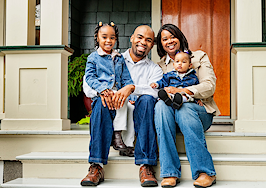From crushing student loan debt, stagnant wage growth to booming home prices, there’s plenty of obstacles preventing millennials from pursuing homeownership. However, the pandemic and the ensuing dive in interest rates pushed this group to leave the sidelines and make a purchase before rates and prices rise again.
Clever Real Estate’s latest market survey of 1,000 millennials revealed just how committed they are to homeownership, with 30 percent of respondents saying “COVID-19 pushed them to begin house hunting earlier than they originally planned.” In addition to upping their homebuying timeline, a majority of millennials were willing to purchase a fixer-upper (71 percent) or could be persuaded to purchase a home sight unseen (80 percent).
For those willing to make an offer sight unseen, they’d need someone to tour the home on their behalf (59 percent), find a listing at a ‘great price point’ (51 percent), or find a new build with no previous owners (39 percent). Respondents also said sellers would need to waive inspection fees, offer repair credit, cover the closing costs or pitch another concession to sweeten the deal (39 percent).
Lastly, another 29 percent said they’d need nothing more than photos or a virtual tour, with 44 percent noting listing photos would be all they needed to make an offer.

Although sight-unseen deals are a way to beat out the competition, Clever warned against the practice especially for first-time homebuyers who don’t fully understand the risks.
“We surveyed recent homebuyers in mid-2020 and found that people are more likely to regret their home purchase when they don’t see their home beforehand,” the report read. “In fact, more than 75 percent of those who bought a home without seeing it first reported some buyer’s remorse — 27 percent more than those who did see their home in-person before buying it.”
Clever said historically-low interest rates are the main driver behind millennials’ risky homebuying practices, with four-times as many millennials from 2019 to 2020 (11 percent vs 40 percent) saying interest rates “are the biggest factor” in their decision-making process.
Even with lower borrowing costs and their willingness to purchase cheaper fixer-uppers, millennials are still having a difficult time purchasing a home. Although millennials spent 2020 building nest eggs of at least $10,000 (57 percent), it’s still not enough to provide a 20 percent down payment within their preferred price range (<$300,000).

Sixty-seven percent of millennials said they can’t provide a 20 percent down payment and are more likely to offer five percent or less (80 percent). No matter the income level, no more than 50 percent of millennials were confident they could cover the full down payment for a “higher-priced home” with their top amenities, such as a large kitchen (60 percent), ample outdoor space (45 percent), or enough space to grow into (43 percent).

Clever said student loan debt is the main obstacle for millennials at all income levels, as 77 percent said they’re currently paying down loans. Half of respondents said student loans “will delay homeownership,” with the average millennial pushing their homebuying goals back seven years.
Nearly 60 percent of respondents said student loan forgiveness of $10,000 would “make a noticeable impact” on their finances, and another 23 percent said it would “wipe out” their debt entirely, making it easier to build a heftier down payment (52 percent), build an emergency fund (51 percent) or upgrade their home wish list (36 percent).
The report said stimulus checks and extended student loan forbearance have placed millennials in a better spot to purchase a home in 2021, but financial anxieties will continue to hinder this generation from meeting its homebuying potential.
“Millennials want more space to work remotely, enjoy outdoor living, and cohabitate with their growing families,” the report read. “Compared to 2020, they have more savings to make homeownership a reality.”
“But these dreams of homeownership are accompanied by financial anxieties,” it concluded. “Millennials are still struggling to afford down payments — and compete against other buyers.”








